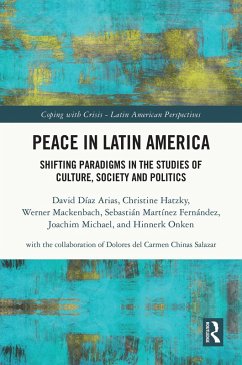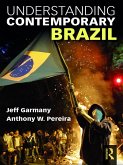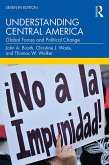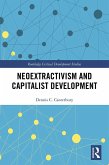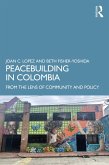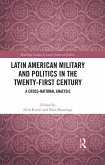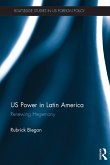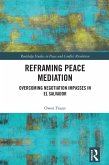David Díaz Arias, Christine Hatzky, Werner Mackenbach, Sebastián Martínez Fernández, Joachim Michael, Hinnerk Onken
Peace in Latin America (eBook, ePUB)
Shifting Paradigms in the Studies of Culture, Society and Politics
43,95 €
43,95 €
inkl. MwSt.
Sofort per Download lieferbar

22 °P sammeln
43,95 €
Als Download kaufen

43,95 €
inkl. MwSt.
Sofort per Download lieferbar

22 °P sammeln
Jetzt verschenken
Alle Infos zum eBook verschenken
43,95 €
inkl. MwSt.
Sofort per Download lieferbar
Alle Infos zum eBook verschenken

22 °P sammeln
David Díaz Arias, Christine Hatzky, Werner Mackenbach, Sebastián Martínez Fernández, Joachim Michael, Hinnerk Onken
Peace in Latin America (eBook, ePUB)
Shifting Paradigms in the Studies of Culture, Society and Politics
- Format: ePub
- Merkliste
- Auf die Merkliste
- Bewerten Bewerten
- Teilen
- Produkt teilen
- Produkterinnerung
- Produkterinnerung

Bitte loggen Sie sich zunächst in Ihr Kundenkonto ein oder registrieren Sie sich bei
bücher.de, um das eBook-Abo tolino select nutzen zu können.
Hier können Sie sich einloggen
Hier können Sie sich einloggen
Sie sind bereits eingeloggt. Klicken Sie auf 2. tolino select Abo, um fortzufahren.

Bitte loggen Sie sich zunächst in Ihr Kundenkonto ein oder registrieren Sie sich bei bücher.de, um das eBook-Abo tolino select nutzen zu können.
This volume sheds light on how social groups and individuals in Latin America resist to violence and strive to create peaceful, or at least less violent, conditions of conviviality. Peace Studies in Latin America is written for a wide and diverse audience not only from Latin America but from all over the world.
- Geräte: eReader
- mit Kopierschutz
- eBook Hilfe
- Größe: 0.91MB
Andere Kunden interessierten sich auch für
![Understanding Contemporary Brazil (eBook, ePUB) Understanding Contemporary Brazil (eBook, ePUB)]() Jeff GarmanyUnderstanding Contemporary Brazil (eBook, ePUB)39,95 €
Jeff GarmanyUnderstanding Contemporary Brazil (eBook, ePUB)39,95 €![Understanding Central America (eBook, ePUB) Understanding Central America (eBook, ePUB)]() John A. BoothUnderstanding Central America (eBook, ePUB)41,95 €
John A. BoothUnderstanding Central America (eBook, ePUB)41,95 €![Neoextractivism and Capitalist Development (eBook, ePUB) Neoextractivism and Capitalist Development (eBook, ePUB)]() Dennis C. CanterburyNeoextractivism and Capitalist Development (eBook, ePUB)45,95 €
Dennis C. CanterburyNeoextractivism and Capitalist Development (eBook, ePUB)45,95 €![Peacebuilding in Colombia (eBook, ePUB) Peacebuilding in Colombia (eBook, ePUB)]() Joan C. LopezPeacebuilding in Colombia (eBook, ePUB)39,95 €
Joan C. LopezPeacebuilding in Colombia (eBook, ePUB)39,95 €![Latin American Military and Politics in the Twenty-first Century (eBook, ePUB) Latin American Military and Politics in the Twenty-first Century (eBook, ePUB)]() Latin American Military and Politics in the Twenty-first Century (eBook, ePUB)42,95 €
Latin American Military and Politics in the Twenty-first Century (eBook, ePUB)42,95 €![US Power in Latin America (eBook, ePUB) US Power in Latin America (eBook, ePUB)]() Rubrick BiegonUS Power in Latin America (eBook, ePUB)45,95 €
Rubrick BiegonUS Power in Latin America (eBook, ePUB)45,95 €![Reframing Peace Mediation (eBook, ePUB) Reframing Peace Mediation (eBook, ePUB)]() Owen FrazerReframing Peace Mediation (eBook, ePUB)43,95 €
Owen FrazerReframing Peace Mediation (eBook, ePUB)43,95 €-
-
-
This volume sheds light on how social groups and individuals in Latin America resist to violence and strive to create peaceful, or at least less violent, conditions of conviviality. Peace Studies in Latin America is written for a wide and diverse audience not only from Latin America but from all over the world.
Hinweis: Dieser Artikel kann nur an eine deutsche Lieferadresse ausgeliefert werden.
Dieser Download kann aus rechtlichen Gründen nur mit Rechnungsadresse in A, B, BG, CY, CZ, D, DK, EW, E, FIN, F, GR, HR, H, IRL, I, LT, L, LR, M, NL, PL, P, R, S, SLO, SK ausgeliefert werden.
Hinweis: Dieser Artikel kann nur an eine deutsche Lieferadresse ausgeliefert werden.
Produktdetails
- Produktdetails
- Verlag: Taylor & Francis eBooks
- Erscheinungstermin: 30. Dezember 2024
- Englisch
- ISBN-13: 9781040153956
- Artikelnr.: 72314113
- Verlag: Taylor & Francis eBooks
- Erscheinungstermin: 30. Dezember 2024
- Englisch
- ISBN-13: 9781040153956
- Artikelnr.: 72314113
- Herstellerkennzeichnung Die Herstellerinformationen sind derzeit nicht verfügbar.
David Díaz-Arias is a Professor of History at the University of Costa Rica, Costa Rica. He has extensively published about different historical topics including the constitution of populism, social movements, state building, national identity, civil war, peace processes, and memory battles in Central America and Costa Rica during the 19th and 21st centuries.
Christine Hatzky is a Professor of Latin American and Caribbean History at Leibniz Universität Hannover, Germany and has further expertise in Atlantic history and the history of Lusophone Africa. Her research focuses on decolonisation processes, South-South cooperation, transnational solidarity networks, and the history of knowledge, violence and peace processes. She is head of the Center for Atlantic and Global Studies (CEAGS) at Leibniz Universität, co-director of the cooperative network project Maria Sibylla Merian Center for Advanced Latin American Studies (CALAS) in Mexico and Costa Rica, funded by the German Ministry of Education and Investigation (BMBF). Her publications include Cubans in Angola: South-South Cooperation and Transfer of Knowledge, 1976-1991 (2015) (Book Prize of the Latin American Studies Association, LASA, 2016) and Lateinamerika 1800-1930 and Lateinamerika seit 1930 (both 2021).
Werner Mackenbach is a Professor of History at the University of Costa Rica, Costa Rica. He is co-director of the Regional Center for Central America and the Caribbean of the cooperative network project Maria Sibylla Merian Center for Advanced Latin American Studies (CALAS). His areas of research are the literary and cultural history and the history of thought of Central America and the Caribbean, as well as memory studies of the region. His recent publications include studies on representations of violence and peace in Central American literature.
Sebastián Martínez Fernández holds a degree in philosophy and a master's degree in Inter-American Studies from the University of Bielefeld. He is a doctoral researcher at the Center for Advanced Latin American Studies CALAS. Currently is a research assistant at the Leibniz Universität Hannover, Germany, where he also teaches. His areas of research are, among others, philosophical and aesthetic perspectives on the relationship between violence and peace, and conservative and nationalist thought.
Joachim Michael holds the Chair of Inter-American Studies and Romance Studies at the University of Bielefeld (Germany). He is co-director of the Regional Center for Central America and the Caribbean of the cooperative network project Maria Sibylla Merian Center for Advanced Latin American Studies (CALAS). He is a specialist in Ibero-American literature and audiovisual culture. His research and publications focus on cultures of peace and violence, the temporal regime of modernity, and televisual and cinematographic cultures in Latin America. He has also written about Ibero-American literature of the colonial era and of the 19th, 20th, and 21st centuries.
Hinnerk Onken is working in the field of Latin American history. Since 2010 he has held positions as substitute professor, assistant professor, and research associate at the Universities of Cologne, Eichstätt, Hannover, and Münster. His PhD thesis (Catholic University of Eichstätt) in 2011 was awarded the prestigious "Kulturpreis Bayern."
Christine Hatzky is a Professor of Latin American and Caribbean History at Leibniz Universität Hannover, Germany and has further expertise in Atlantic history and the history of Lusophone Africa. Her research focuses on decolonisation processes, South-South cooperation, transnational solidarity networks, and the history of knowledge, violence and peace processes. She is head of the Center for Atlantic and Global Studies (CEAGS) at Leibniz Universität, co-director of the cooperative network project Maria Sibylla Merian Center for Advanced Latin American Studies (CALAS) in Mexico and Costa Rica, funded by the German Ministry of Education and Investigation (BMBF). Her publications include Cubans in Angola: South-South Cooperation and Transfer of Knowledge, 1976-1991 (2015) (Book Prize of the Latin American Studies Association, LASA, 2016) and Lateinamerika 1800-1930 and Lateinamerika seit 1930 (both 2021).
Werner Mackenbach is a Professor of History at the University of Costa Rica, Costa Rica. He is co-director of the Regional Center for Central America and the Caribbean of the cooperative network project Maria Sibylla Merian Center for Advanced Latin American Studies (CALAS). His areas of research are the literary and cultural history and the history of thought of Central America and the Caribbean, as well as memory studies of the region. His recent publications include studies on representations of violence and peace in Central American literature.
Sebastián Martínez Fernández holds a degree in philosophy and a master's degree in Inter-American Studies from the University of Bielefeld. He is a doctoral researcher at the Center for Advanced Latin American Studies CALAS. Currently is a research assistant at the Leibniz Universität Hannover, Germany, where he also teaches. His areas of research are, among others, philosophical and aesthetic perspectives on the relationship between violence and peace, and conservative and nationalist thought.
Joachim Michael holds the Chair of Inter-American Studies and Romance Studies at the University of Bielefeld (Germany). He is co-director of the Regional Center for Central America and the Caribbean of the cooperative network project Maria Sibylla Merian Center for Advanced Latin American Studies (CALAS). He is a specialist in Ibero-American literature and audiovisual culture. His research and publications focus on cultures of peace and violence, the temporal regime of modernity, and televisual and cinematographic cultures in Latin America. He has also written about Ibero-American literature of the colonial era and of the 19th, 20th, and 21st centuries.
Hinnerk Onken is working in the field of Latin American history. Since 2010 he has held positions as substitute professor, assistant professor, and research associate at the Universities of Cologne, Eichstätt, Hannover, and Münster. His PhD thesis (Catholic University of Eichstätt) in 2011 was awarded the prestigious "Kulturpreis Bayern."
Introduction: Shifting the Paradigm from Violence to Peace in Latin America 1. The Epistemological Foundations of Peace Studies 2. Culture
Arts
and Peace in Latin America 3. State Politics
Public Opinion
and Peace: A Case Study from Central America 4. Civil Society and Peace: Four Case Studies from Latin America
Arts
and Peace in Latin America 3. State Politics
Public Opinion
and Peace: A Case Study from Central America 4. Civil Society and Peace: Four Case Studies from Latin America
Introduction: Shifting the Paradigm from Violence to Peace in Latin America 1. The Epistemological Foundations of Peace Studies 2. Culture
Arts
and Peace in Latin America 3. State Politics
Public Opinion
and Peace: A Case Study from Central America 4. Civil Society and Peace: Four Case Studies from Latin America
Arts
and Peace in Latin America 3. State Politics
Public Opinion
and Peace: A Case Study from Central America 4. Civil Society and Peace: Four Case Studies from Latin America
